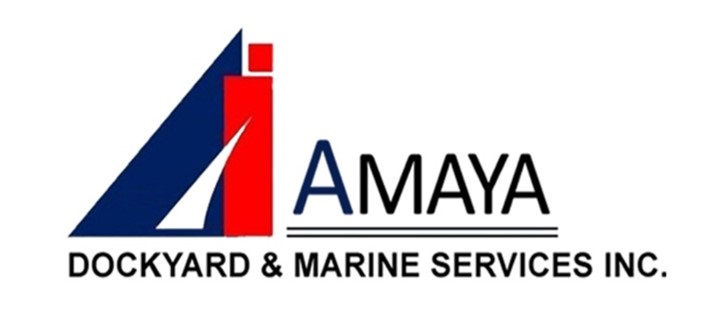In the bustling shipyards of the Philippines, a remarkable transformation is taking place. Hidden away in these secret havens, skilled craftsmen and engineers are undertaking the extraordinary task of vessel conversion. What were once ordinary cargo ships or aging warships are now being meticulously redesigned and reborn as luxurious yachts, floating hotels, or even state-of-the-art research vessels. This quiet revolution in maritime engineering is happening under the radar, but its impact on the global shipping industry is already making waves. Join us as we delve into the world of secret shipyard makeovers in the Philippines and discover how these hidden gems are reshaping the future of seafaring.
Click here to view our ship conversion and modification capabilities in Tanza, Cavite.
The Rise of Vessel Conversion in the Philippines
Vessel conversion in the Philippines has become a rising trend in shipbuilding companies in Cavite, Manila, Navotas, Batangas, Cebu, Subic Bay, and Davao, as shipyards are undergoing impressive makeovers to accommodate this growing industry. With its strategic location and skilled workforce, the country is becoming a prime destination for vessel owners from around the world looking to repurpose their ships. One of the reasons behind this surge in vessel conversion is cost-effectiveness. Retrofitting an existing vessel is often more economical than building a new one from scratch, making it an attractive option for shipowners looking to maximize their investments.
Another notable factor driving the rise of vessel conversion in the Philippines is sustainability. As countries worldwide increasingly focus on environmental concerns and regulations, repurposing old ships can help reduce carbon emissions and contribute to a more sustainable maritime sector. This shift towards green solutions aligns with both international standards and local government initiatives. The Philippine government has been proactive in supporting these efforts by providing incentives such as tax breaks and subsidies to attract more vessel conversions into the country.
As Philippine shipyards undergo transformations to cater specifically to vessel conversions, they are paving the way for increased employment opportunities and technological advancements. Skilled professionals within the shipbuilding and engineering sectors are finding new avenues for growth, bringing fresh expertise into this evolving field. Moreover, with shipyard makeovers also comes innovation—state-of-the-art equipment and technologies that can efficiently retrofit vessels while minimizing downtime.
Vessel conversion represents not only an economic opportunity but also an environmentally friendly approach to prolonging the life cycle of ships while responding flexibly to market demands.
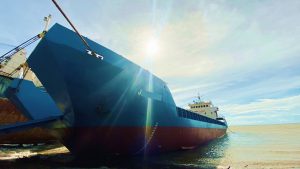
The History of Shipbuilding in the Philippines
The history of shipbuilding in the Philippines dates back centuries, with evidence of ancient trading vessels being constructed by indigenous communities long before the arrival of European colonizers. However, it was during the Spanish colonial period that shipbuilding truly flourished, as Manila became a major port for trade and maritime commerce in Southeast Asia. The Spanish brought with them advanced shipbuilding techniques and introduced larger vessels that could withstand longer voyages across oceans.
In the modern era, shipbuilding in the Philippines experienced a revival following World War II. With a highly skilled workforce and abundant natural resources such as timber and steel, numerous shipyards were established across the country to meet the growing demand for merchant ships. The industry continued to evolve throughout the 20th century, adopting new technologies and methods to keep up with international standards.
Today, Philippine shipyards are recognized globally for their expertise in vessel conversion. As regulations on maritime pollution become stricter worldwide, many older vessels need to be upgraded or repurposed to comply with environmental standards. Filipino shipbuilders have taken advantage of this market niche by offering cost-effective solutions for vessel conversions. Through innovative engineering and skilled craftsmanship, they breathe new life into aging ships while also meeting sustainability goals.
The history of shipbuilding in the Philippines is a testament to centuries-old tradition blended with modern innovations. From humble beginnings as primitive sailboats crafted by indigenous artisans to becoming global leaders in vessel conversion services, Filipino shipbuilders have made significant contributions to maritime trade and development throughout history.
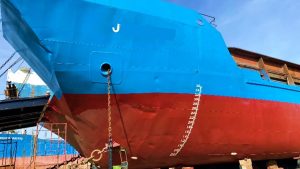
The Philippine Advantage: A Hub for Shipyard Makeovers
The Philippines is a hidden gem when it comes to shipyard makeovers. With its strategic location in Southeast Asia and a rich maritime tradition, the country offers a unique advantage for vessel conversion projects. One of the key factors that makes the Philippines an ideal hub for shipyard makeovers is its skilled workforce. The nation boasts a pool of highly trained and experienced professionals, including naval architects, marine engineers, and skilled shipbuilders who are experts in their respective fields.
Furthermore, the cost-effectiveness of shipyard makeovers in the Philippines cannot be overstated. Compared to other countries in the region or even globally, labor rates in the Philippines remain relatively low while maintaining high-quality standards. These favorable cost dynamics attract shipowners and operators from around the world to choose Filipino shipyards for their vessel conversion needs.
In addition to skilled manpower and competitive costs, another advantage that sets Philippine shipyards apart is their adaptability to various vessel types and sizes. Whether it’s offshore support vessels, passenger ferries, or bulk carriers, Philippine shipyards have proven time and again their capability to handle diverse conversion projects with precision and efficiency.
With these compelling attributes combined—a talented workforce capable of handling complex conversions at affordable prices—it is no wonder why more shipping companies are turning to Philippine shipyards for their makeover needs. The archipelago’s emergence as a top destination for vessel conversions presents exciting opportunities not only for economic growth but also for leveraging local expertise in revitalizing aging fleets worldwide.
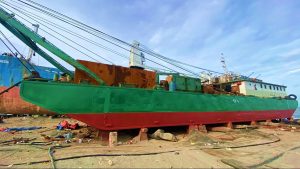
Types of Vessels Converted in the Philippines
The vessel conversion industry is a fascinating and rapidly growing sector of the maritime world. With advancements in technology and changes in market demands, shipyards all over the world are seizing the opportunity to repurpose existing vessels for new purposes. In the Philippines, this industry is particularly booming, thanks to its strategic location, skilled workforce, and favorable business environment.
One of the most exciting aspects of vessel conversion is the sheer diversity of projects that can be undertaken. From transforming old oil tankers into floating hotels or luxury resorts to converting cargo ships into mobile hospitals or research centers, there seems to be no limit to what can be achieved through creative engineering and design. This flexibility makes vessel conversion an attractive option for both shipowners looking for new revenue streams and organizations seeking innovative solutions in various industries.
However, vessel conversion is not without its challenges. As each project requires unique modifications and upgrades, shipyards must possess a high level of expertise and experience. Additionally, safety regulations and environmental considerations play a crucial role in ensuring that converted vessels meet industry standards without compromising sustainability. Nevertheless, with careful planning, expert craftsmanship, and a forward-thinking approach, vessel conversion has the potential to revolutionize maritime operations as we know them today.
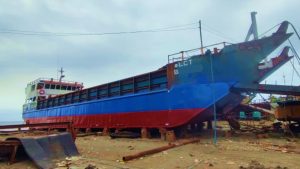
Tanker to Floating Storage and Regasification Unit (FSRU)
The conversion of a tanker into a floating storage and regasification unit (FSRU) is a remarkable feat that requires meticulous planning and skilled engineering. This process involves transforming an enormous vessel designed for transporting oil or gas into a sophisticated facility capable of receiving liquefied natural gas (LNG), storing it temporarily, and converting it back to its gaseous state for distribution. The Philippines has been at the forefront of FSRU conversions, with many shipyards undertaking these ambitious projects.
One of the key challenges in converting tankers into FSRUs is ensuring the vessel’s structural integrity and safety standards are met. Engineers must carefully assess the tanker’s ability to withstand the weight and pressure exerted by LNG storage, as well as endure harsh marine conditions. Strengthening measures such as reinforcing the hull, installing additional support systems, and upgrading electrical equipment are required to meet these rigorous demands.
Moreover, managing potential risks associated with LNG operations becomes paramount during tanker conversion. This includes installing safety features like fire protection systems, emergency shutdown valves, and leak detection mechanisms to mitigate any potential accidents or incidents. Additionally, creating an efficient ventilation system is crucial in maintaining safe operating conditions within the FSRU.
Overall, converting tankers into FSRUs not only demands technical expertise but also highlights the commitment to expanding energy infrastructure in countries like the Philippines that rely on imported natural gas for their energy needs.
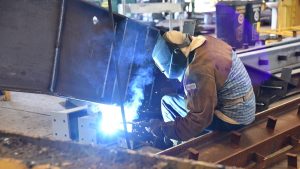
Cargo Ship to Offshore Accommodation Vessel
One of the most intriguing transformations happening in the shipyard industry today is the conversion of cargo ships into offshore accommodation vessels. This innovative practice involves repurposing large cargo ships, typically used for transporting goods across vast distances, into floating living quarters for workers in offshore oil and gas operations.
The concept behind this conversion is simple yet revolutionary: instead of building specialized accommodation vessels from scratch, shipyards are adapting existing cargo ships to meet the unique needs of offshore workers. By retrofitting these vessels with comfortable living spaces, recreational areas, and essential facilities like dining halls and medical rooms, companies can save both time and resources while still providing a safe and comfortable environment for their employees at sea.
The advantages of converting cargo ships into offshore accommodation vessels are numerous. First and foremost, it allows for a more sustainable approach to vessel construction as it reduces waste by reusing existing assets. Moreover, converting cargo ships offers a faster turnaround time compared to building new accommodation vessels from scratch since much of the structural work is already in place. Additionally, this practice provides an excellent solution to tight budgets or urgent demands for additional accommodations in offshore operations.
Overall, transforming cargo ships into offshore accommodation vessels presents a unique opportunity for shipyards to showcase their ingenuity and adaptability within the maritime industry. As demand for such conversions continues to grow, it will be fascinating to see how shipyards push boundaries even further by offering new design innovations that enhance safety measures and improve workers’ living conditions onboard these converted floating homes away from home.

Ferry Boat to Luxury Yacht
One of the most fascinating shipyard makeovers happening in the Philippines right now is the transformation of old ferry boats into luxurious super yachts. These vessels, once used to transport people and vehicles across bodies of water, are now being upgraded with sleek exteriors, opulent interiors, and state-of-the-art amenities.
The conversion process involves stripping down the original ferry boat to its bare bones and reconstructing it with a completely new design. The result? A stunning luxury yacht that rivals those found in exclusive marinas around the world. This trend is not only cost-effective but also environmentally friendly as it repurposes existing maritime infrastructure rather than constructing brand-new vessels.
Imagine exploring crystal clear waters on a vessel that combines history, charm, and lavishness all in one package. These converted ferries offer an unparalleled experience for travelers seeking a unique adventure at sea. From spacious cabins with en-suite bathrooms to gourmet dining options and expansive lounges, these luxury yachts provide every comfort imaginable.
Why settle for a run-of-the-mill vacation when you can sail away on a meticulously transformed ferry boat-turned-luxury yacht? The Philippine shipyards are leading the charge in this growing trend, proving that beauty can be found even in unexpected places. So whether you’re an avid sailor or simply seeking new horizons to explore, consider embarking on a journey aboard one of these incredible vessel conversions – it’s sure to be an unforgettable experience unlike any other on the seven seas.
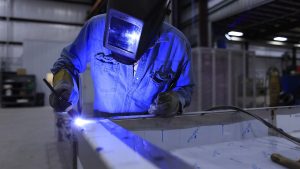
Tugboat to Research Vessel
One of the fascinating transformations that take place in shipyards is the conversion of tugboats into research vessels. While tugboats are typically associated with towing and maneuvering large ships, their small size and maneuverability make them ideal candidates for conversion into research vessels. By retrofitting these sturdy workhorses, shipyards in the Philippines are contributing to scientific exploration and marine conservation efforts.
The conversion process involves outfitting the tugboat with state-of-the-art scientific equipment, such as sonar systems and hydrographic survey instruments, which allow researchers to gather data about ocean depth, currents, and marine life. This transformation opens up a world of possibilities for research teams who can now delve into previously unexplored areas of the ocean. Additionally, these converted vessels often provide a stable platform for launching smaller remotely operated vehicles (ROVs), allowing researchers to reach greater depths and capture high-resolution images of underwater ecosystems.
Tugboat-to-research-vessel conversions not only expand scientific capabilities but also promote sustainability by minimizing waste. Rather than building new vessels from scratch, repurposing existing boats reduces environmental impact while still achieving impressive results in terms of functionality and utility.
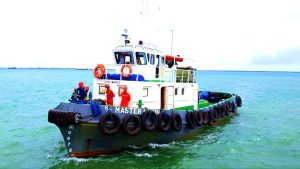
Deck Barge to Floating Restaurant
The transformation of a deck barge into a floating restaurant is no ordinary makeover. It requires meticulous planning, innovative design, and skilled craftsmanship to turn an industrial vessel into a stylish eatery on water. The deck barge, once used for carrying heavy cargo, now offers breathtaking views and a unique dining experience for locals and tourists alike.
One of the challenges of converting a deck barge into a floating restaurant is maximizing space without compromising safety. The layout must be carefully thought out to accommodate seating areas, bar counters, kitchen facilities, and restrooms while adhering to maritime regulations. Designers often incorporate large windows or open-air decks to take advantage of the natural surroundings and create an inviting ambiance.
Another interesting aspect of this type of conversion is the integration of various culinary concepts. Floating restaurants often feature diverse menus that showcase local cuisine as well as international flavors. Being surrounded by water adds an extra dimension to the dining experience and provides opportunities for specialties such as seafood dishes or boat-themed cocktails.
The transformation from deck barge to floating restaurant brings new life to these vessels, offering a unique dining option that combines functionality with aesthetic appeal. Whether it’s a romantic dinner overlooking the sunset or hosting events against the picturesque backdrop of the sea, these rejuvenated barges have become sought-after destinations for those seeking memorable experiences on land and water alike.
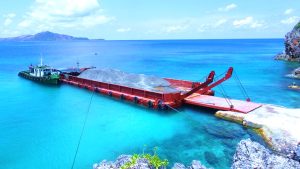
Cargo Vessels: Types and Examples of Converted Cargo Vessels
One type of cargo vessel that has gained popularity in recent years is the container ship. These large vessels are designed to transport standardized shipping containers, which allows for efficient loading and unloading processes. With the rise of e-commerce and global trade, container ships have become an essential part of the logistics industry. In terms of converted cargo vessels, container ships provide a unique opportunity for transformation due to their size and structure.
Another example of a converted cargo vessel is the tanker ship. Originally used for transporting liquid goods such as oil or gas, tanker ships can be repurposed into floating storage facilities or even transformed into luxury floating hotels. The possibilities are endless when it comes to converting tanker ships, as their strong hulls and spacious interiors make them suitable for various projects beyond their original function.
In conclusion, cargo vessels offer immense potential for conversion projects in the shipbuilding industry. From container ships to tanker ships, these versatile vessels provide opportunities for creative transformations that go beyond traditional maritime applications. As technology advances and demand shifts within various industries, converting these cargo vessels will continue to play a significant role in shaping the future of maritime architecture.
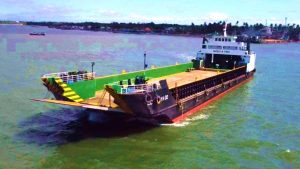
Passenger Vessels: Conversion Options for Passenger Vessels
The demand for passenger vessels has evolved over the years, with a growing need for vessels that are environmentally friendly and technologically advanced. This shift in demand presents a significant opportunity for shipyards in the Philippines to specialize in vessel conversions. By transforming existing passenger vessels, shipyards can cater to changing market needs while also reducing costs and environmental impact.
One conversion option is retrofitting passenger vessels with hybrid propulsion systems. These systems combine traditional diesel engines with electric power sources, such as batteries or fuel cells. Hybrid propulsion offers several advantages, including reduced emissions and increased fuel efficiency. In addition, it allows vessels to operate silently, providing a more comfortable experience for passengers and minimizing noise pollution in sensitive areas.
Another conversion option gaining popularity is transforming traditional passenger vessels into expedition cruise ships. With travelers seeking unique experiences and off-the-beaten-path destinations, expedition cruises have seen a surge in popularity. By converting existing passenger ships into expedition cruise ships equipped with ice-strengthened hulls and specialized equipment like zodiac boats and submarines, shipyards can tap into this lucrative market segment.
Vessel conversion presents an exciting opportunity for shipyards in the Philippines to meet the evolving demand for passenger vessels. Through options such as hybrid propulsion systems or transforming into expedition cruise ships, these conversions allow shipyards to adapt to changing market needs while promoting sustainability and offering unique experiences for passengers. With the right expertise and resources available locally, the possibilities of vessel conversion are endless for Philippine shipyards.
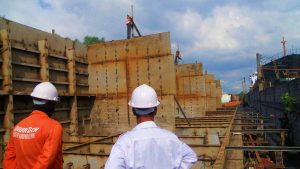
Offshore Support Vessels: Popular Vessel Conversions for Offshore Support
Offshore support vessels (OSVs) have become increasingly popular choices for vessel conversions in the offshore industry. These versatile ships are equipped with the necessary tools and equipment to provide support services to oil rigs, platforms, and other offshore installations. With their robust structures and ample deck space, OSVs offer an ideal platform for various conversion projects.
One of the most common conversions for OSVs is transforming them into accommodation barges. As offshore operations often require a large workforce to stay near the job site for extended periods, converting an OSV into a floating accommodation facility provides a cost-effective solution. These converted barges can house hundreds or even thousands of crew members, complete with living quarters, dining areas, recreational facilities, and medical centers.
Another popular conversion for OSVs is to turn them into dive support vessels (DSVs). DSVs are specially equipped to support diving operations in deep waters or harsh environments by providing divers with essential equipment and amenities. By converting an OSV into a DSV, shipyards can upgrade existing vessels to meet industry-specific requirements such as dive control rooms, decompression chambers, hyperbaric rescue systems, moon pools for easy access to the water, and storage spaces for diving equipment.
Offshore support vessels are favored choices for conversion projects due to their inherent capabilities and adaptability. The flexibility offered by these vessels allows shipyards in the Philippines and around the world to undertake challenging transformations that cater specifically to offshore industry needs.
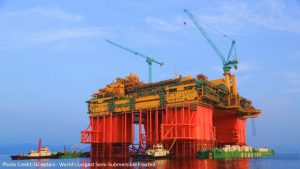
Fishing Vessels: Common Conversions for Fishing Vessels in the Philippines
The Philippines is known for its rich fishing industry, and as such, the country sees a fair share of fishing vessel conversions. One common conversion that has gained popularity is the transformation of traditional wooden boats into steel-hulled vessels. This upgrade not only enhances the durability and stability of the vessel but also allows for improved safety features such as life rafts and fire prevention systems. Additionally, a steel hull makes it easier to install modern fishing equipment like echo sounders and GPS navigation systems, enabling fishermen to locate shoals more accurately and efficiently.
Another common conversion in the Philippine fishing industry involves upgrading small-scale outrigger canoes into motorized boats with increased carrying capacity. These conversions are often done to accommodate the growing demand for fish in local markets or to cater to larger international markets. By equipping these traditional boats with engines and expanding their size, fishermen gain greater mobility and can cover larger fishing grounds in search of bountiful catches. Furthermore, these upgraded vessels provide opportunities for enhanced storage capacities, ensuring that fresh catches remain in optimal condition throughout extended journeys at sea.
A notable trend in recent years has been the conversion of surplus military vessels into dedicated fishing trawlers or supply ships for commercial purposes. With their sturdy construction and ample space, retired naval ships, such as landing crafts or patrol boats, undergo extensive modifications to serve an entirely new purpose within the maritime sector.

Benefits of Vessel Conversion in the Philippines
One of the major benefits of vessel conversion in the Philippines is its cost-effectiveness. Shipyard makeovers and vessel conversions in the country offer a significantly lower cost compared to building new vessels. This makes it an attractive option for ship owners and operators looking to upgrade their existing ships or repurpose older vessels for different purposes.
Additionally, vessel conversion in the Philippines allows for faster turnaround times. The skilled workforce and advanced shipyard facilities in the country enable efficient project execution, resulting in reduced downtime for vessels undergoing conversions. This is particularly advantageous in industries where time is of the essence, such as offshore oil and gas operations or renewable energy projects.
Furthermore, vessel conversion offers environmental benefits by promoting sustainability and reducing waste. By refurbishing existing vessels instead of constructing new ones, fewer resources are required, leading to a smaller carbon footprint. Additionally, repurposing older ships allows them to continue serving various roles within different industries instead of being prematurely scrapped.
Vessel conversion in the Philippines provides not only cost savings and shorter project timelines but also contributes to sustainable maritime practices. As a result, it is no surprise that many ship owners and operators are choosing this option to improve their fleet’s capabilities while minimizing their environmental impact.
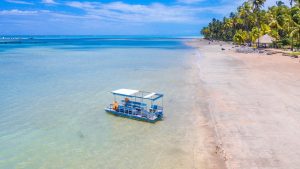
Challenges and Limitations of Vessel Conversion
One of the major challenges of vessel conversion is the complex process involved in transforming a ship from one type to another. Each conversion requires careful planning, engineering expertise, and significant resources to ensure that the vessel meets all safety standards and regulations. This includes modifying the structural integrity of the ship, installing new machinery and equipment, and making necessary adjustments to accommodate different cargo or passengers.
Another limitation is the cost associated with vessel conversion. Converting a ship can be an expensive endeavor, often requiring substantial investment in labor, materials, and specialized equipment. Additionally, unexpected challenges or complications during the conversion process can lead to increased costs and delays. These financial burdens may discourage some ship owners from pursuing vessel conversion as a viable option for revamping their fleet.
Despite these challenges and limitations, vessel conversion offers numerous advantages for ship owners looking to modernize their fleets or enter new markets. By repurposing existing vessels instead of building new ones from scratch, shipping companies can save time and money while reducing their environmental impact. Additionally, converted ships can be tailored to meet specific operational requirements or take advantage of emerging industry trends such as offshore wind energy installations or eco-friendly tourism initiatives. Vessel conversion has tremendous potential for revitalizing the maritime industry by breathing new life into older ships and creating opportunities for growth in various sectors.
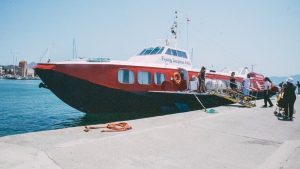
Regulations and Standards for Vessel Conversion in the Philippines
The Philippines has been emerging as a hub for vessel conversion in recent years, attracting shipyards from around the world. However, these conversions are not without their challenges. One of the biggest hurdles is navigating through the complex web of regulations and standards that govern vessel conversion in the country.
The Maritime Industry Authority (MARINA) is responsible for regulating and setting standards for vessel conversion projects in the Philippines. They ensure that all conversions comply with international safety and environmental requirements. This includes approval of design plans, inspection of materials used, and certification of completed projects. MARINA also conducts regular audits to ensure compliance with ongoing maintenance and repair work.
One interesting aspect of Philippine regulations is their emphasis on sustainable practices in vessel conversion projects. The government encourages shipyards to incorporate eco-friendly technologies such as renewable energy systems, fuel-efficient engines, and waste management systems into their converted vessels. These regulations not only promote environmental sustainability but also provide a competitive edge for Filipino shipyards in the global market.
Navigating through these regulations can be challenging for shipyard owners and operators interested in vessel conversion in the Philippines. However, by understanding and complying with these standards, they can harness this emerging market’s potential while contributing to sustainable maritime practices globally.

Challenges and Innovations in Vessel Conversion
One of the biggest challenges in vessel conversion is ensuring the structural integrity of the ship after modifications. Each vessel has its own unique characteristics and limitations, so shipyards must carefully assess and plan for any modifications to ensure they do not compromise the overall strength and stability of the ship. This requires a deep understanding of naval architecture principles and a thorough examination of the existing structure. However, with advancements in technology and computer-aided design software, shipyards are now able to simulate various conversion scenarios and evaluate their impact on hull strength more effectively.
Another challenge in vessel conversion is complying with international regulations and standards. Ships are subject to numerous rules governing safety, environmental protection, and operational performance. When converting a vessel for a new purpose or upgrading its systems, shipyards need to ensure that all modifications adhere to these regulations. This includes making necessary changes to equipment such as navigation systems, fire safety measures, waste management systems, and more. By collaborating closely with classification societies like ABS or Bureau Veritas, which provide guidance on compliance requirements throughout the process, shipyards can navigate these complexities more effectively.
Innovation plays a crucial role in overcoming these challenges in vessel conversion. Shipbuilders are constantly exploring new technologies and materials that can improve efficiency, reduce costs, and enhance performance during conversions. For example, advanced coatings are now being used to protect hulls against corrosion while also reducing drag for better fuel economy.
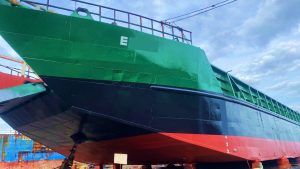
Future Prospects for Vessel Conversion
As the demand for sustainable shipping increases, vessel conversion presents a promising future for shipyards in the Philippines. With its strategic location and skilled workforce, the country is poised to become a leading destination for shipyard makeovers. Vessel conversion offers numerous opportunities for shipyards, not only in terms of financial gains but also in contributing to environmental preservation.
One significant area of growth lies in the conversion of conventional vessels into hybrid or electric-powered ships. As countries worldwide set stricter emissions standards, many shipowners are looking to convert their existing fleets to meet these requirements. The Philippines’ shipyards have already begun exploring this option, with several successful conversions completed in recent years. This trend is likely to continue as more companies prioritize sustainability and seek cost-effective ways to reduce their carbon footprint.
Additionally, vessel conversion opens up possibilities for repurposing older ships into specialized vessels for various industries, such as offshore wind farming or aquaculture. With the increasing demand for renewable energy and sustainable food production, there is a growing need for custom-built vessels that can support these industries’ unique requirements. Shipyards that excel in vessel conversion will be well-positioned to take advantage of this market niche while simultaneously promoting environmentally friendly practices.
Vessel conversion holds tremendous potential for shipyards in the Philippines looking to capitalize on sustainable shipping trends. By embracing this new frontier of maritime innovation, shipbuilding companies can transform outdated vessels into eco-friendly alternatives and tap into emerging markets seeking customized solutions.
Looking for a Vessel Conversion Company in the Philippines?
If you’re in need of a vessel conversion company in the Philippines, look no further than Amaya Dockyard & Marine Services Inc. (ADMSI). With years of experience in the industry, ADMSI has established itself as a trusted provider of quality and cost-effective services.
- Email us: info@amayadockyard.com
- Call our 24-hour hotline: +63 917 633 0479
- Viber: +63 917 633 0479
- WhatsApp: +63 917 633 0479
- Facebook Messenger: Click here
- Click here to inquire
What sets ADMSI apart from its competitors is its commitment to excellence. The company takes pride in delivering projects on time and within budget, ensuring that clients get the best value for their money. From small-scale modifications to full-fledged conversions, ADMSI’s team of skilled professionals can handle any project with precision and expertise.
One key advantage of choosing ADMSI is its location in the Philippines. With its strategic position in Southeast Asia, the country offers a wealth of resources and expertise when it comes to shipyard makeovers. Not only does this translate into lower costs compared to other regions, but it also means easy accessibility to international markets. By partnering with ADMSI, you can tap into these advantages while receiving top-notch service from a reputable company.
If you’re looking for a vessel conversion company in the Philippines, don’t hesitate to consider Amaya Dockyard & Marine Services Inc. (ADMSI). Their track record speaks for itself—they provide quality and cost-effective solutions while maintaining high standards of professionalism. With their expertise and strategic location, they are well-equipped to handle all your shipyard makeover needs.
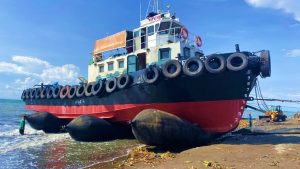
Summary: Vessel Conversion in the Philippines
In conclusion, the Philippines offers a myriad of vessel conversion options that cater to various industries and needs. One prominent option is the conversion of old tankers into floating power plants, which addresses the country’s energy demand while also repurposing aging vessels. This innovative approach not only provides a cost-effective solution but also showcases the country’s commitment to renewable energy sources.
Furthermore, another notable conversion option in the Philippines is transforming cargo ships into offshore accommodation units. With its prime location in Southeast Asia and close proximity to major shipping routes, the country has become an ideal destination for offshore operations. By converting existing vessels into comfortable living quarters for offshore workers, companies can save significant time and money compared to building new facilities from scratch.
Overall, vessel conversion in the Philippines presents abundant opportunities for both local companies and international investors. With its skilled workforce, favorable regulatory environment, and strategic location, it is poised to become a hub for shipyard makeovers. As more industries recognize the benefits of repurposing existing vessels rather than investing in new construction projects, this emerging trend holds great potential for both economic growth and sustainability in the region.
